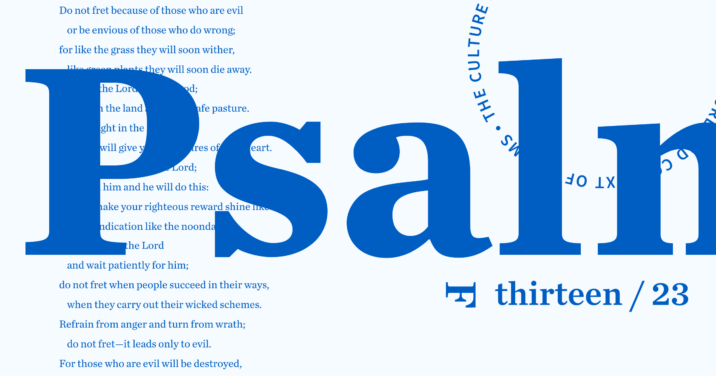Throughout the Bible there is a theme that you might call “choosing between two ways.” It starts with the two trees in the Garden of Eden narrative: the Tree of the Knowledge of Good and Evil produced death, while the Tree of Life was a source of Eternal Life. You see it also in Deuteronomy, when God tells Israel they have a choice to make: life and prosperity, or death and destruction (Deut 30:15–16).
Five Psalms in particular urge readers to choose between two ways; and all point to the way of life and, ultimately, the way Jesus brings redemption to the world.
Psalm 1
Psalm 1 is the foundation for the whole Psalter. In this Psalm, we are immediately introduced to a comparison between two people who make very different choices: the “blessed man” and the “wicked.”
The former is identified by three things he avoids and by one thing that he does. The “blessed” man does not walk in the counsel of the wicked, he does not stand in the way of sinners, and he does not sit in the seat of scoffers. Instead, he chooses to delight in the law of the Lord through a rhythm of daily and nightly meditations. As a result, the blessed man becomes a fruitful tree that is rooted deeply in the soil beside a flowing stream.
In contrast, the wicked does not delight in God’s law and has no rhythm of daily and nightly meditation on it. As a result, the wicked becomes chaff blowing in the wind. “The way of the wicked will perish,” the Psalm says.
The metaphors here in Psalm 1 are rich; they suggest that the two “ways,” while leading to different places, may not always be obviously distinct in this life. A tree that is planted does not rapidly grow roots and spring up overnight. A tree planted is first a seed buried. Chaff, on the other hand, is either the husk of winnowed grain or dried grass (see the Lexham Bible Dictionary). Grain and grass grow at a much quicker rate and yield a larger quantity of produce than a tree. Depending on the stage at which you compare the tree and the grass, it can appear that the grass is outgrowing the tree. The way of the tree is different from the way of the grass. The way of the tree requires time and patience.
“The way of the wicked” (Ps 1:6) is a wicked and worldly understanding of how the world works, of what it takes to be successful. James Hamilton’s commentary on Psalms in the Evangelical Biblical Theology Commentary series brings out the connection between the blessed man in Psalm 1 and Israel’s king in Deuteronomy 17. Both choose the way of obedience to Yahweh instead of following the ways of other nations. Like the blessed man in Psalm 1, this obedient king is identified by three things he avoids and by one thing that he does. The obedient king will not acquire many horses for himself, he will not acquire many wives for himself, and he will not acquire for himself excessive riches. The kings from the other nations established their kingdoms by acquiring horses to build strong militaries. They acquire many wives in order to have many sons. Finally, these kings acquire silver and gold to have the wealth to accomplish whatever they desire.
The one thing that the obedient king of Deuteronomy 17 does do is practically identical to what the blessed man does in Psalm 1. The obedient king writes for himself a copy of the Torah to read every day of his life. The obedient king’s trust is in Yahweh not in the way of the wicked.
Psalm 2
Psalm 1 flows right into Psalm 2. The wicked from Psalm 1 are the raging nations of Psalm 2. A closer look at the wording in these two Psalms will show a contrast between the blessed man and the raging nations. In Psalm 1:2, the blessed man meditates on the Torah and is fruitful, and in Psalm 2:1 the raging nations meditate on how to cast off the rule of Yahweh and are dashed to pieces like broken pottery. The blessed man in Psalm 1 is also Yahweh’s Anointed in Psalm 2. In Psalm 2:8, Yahweh offers to give his anointed king the nations as an inheritance. This offer to receive the nations as an inheritance sounds like the “blessed meek” from the Beatitudes, who will “inherit the earth.” Yahweh’s anointed King does not need to rage or follow the counsel of the wicked to make things happen, rather by meekness and trust, the anointed king receives as an inheritance the very thing the wicked plots to take by force.
Psalm 37
Psalm 37 beautifully ties together the two ways contrasted in Psalm 1 and 2. David exhorts the righteous to not be envious when the wicked appear to be succeeding, because the wicked will eventually wither like grass. David calls the righteous to continue trusting and delighting in Yahweh, and he encourages them to keep doing good and to wait patiently on Yahweh.
It’s hard to be still and trust God when it looks like others are experiencing success without him. Everything inside of you wants to take matters into your own hands, to lean on your own understanding. It’s in these moments that we need these simple but grounding words from Psalm 37: “Be still.” Stillness looks and feels like passivity, but the reality is that stillness centers us in the presence of God and anchors us in his goodness. This is the subversive mystery of meekness. Psalm 37 brings out the same counterintuitive message Jesus brings in the Sermon on the Mount (see Matt 5:5):
But the meek will inherit the land and enjoy peace and prosperity. (Ps 37:11 NIV)
Psalm 110
Psalm 110 is one of the most difficult psalms in the Psalter; and yet it is the psalm most often quoted in the New Testament. My focus in Psalm 110 is in its connection to Psalm 2. Both of these Psalms prophetically look forward to a future king of Israel—a righteous, exalted, and conquering king. The fascinating similarity between these two psalms lies in how precisely the anointed king conquers his enemies. In Psalm 2 the king receives the nations as an inheritance from a father; the king in Psalm 110 conquers his enemies by sitting down. Both psalms describe a violent battle and victory without the king having to fight.
The big reveal in the New Testament is that Jesus is the blessed man from Psalm 1, the anointed king from Psalm 2, the victorious king from Psalm 110, and the obedient king from Deuteronomy 17. Jesus is the king of glory that is mighty in battle from Psalm 24; but Jesus never picks up a sword and never takes the life of his enemies (John 18:36).
Jesus is victorious in battle not by taking the life of his enemies, but by laying his life down for his enemies. Like the obedient king from Deuteronomy 17 and the blessed man from Psalm 1, Jesus avoided three temptations in the wilderness and chose the way of self-emptying love. Satan presented Jesus with ways to accomplish his mission through the use of power by showing him a wide and easy path to success. Jesus refused to follow the counsel of the wicked by choosing the hard and narrow path of being a seed planted in the ground. Instead of riding into Jerusalem on a warhorse and slaughtering his enemies, Jesus meekly rode into Jerusalem on a donkey, armed only with the gospel of peace (Matt 21:5). The way of humility and self-giving love that Jesus demonstrated appeared to be foolish and weak, but it was the power that crushed the enemy. Paul brings this out in 1 Corinthians 1:25, “For the foolishness of God is wiser than human wisdom, and the weakness of God is stronger than human strength.”1
The mustard seed
In Matthew 13:31–32, Jesus compares the kingdom of heaven to a mustard seed. A small seed that appears insignificant to other seeds. But once that small insignificant seed is planted in the ground, in time it grows into the largest of garden plants and eventually becomes a tree. This is a good reminder for the times when we might question if what we are doing has any eternal significance, or when we are tired and fatigued from the difficult path of doing good. Our trust is not in the counsel of the wicked but in the faithful love of a crucified king.
Related articles
- Why Are There Lament Psalms at the End of the Psalter?
- Pray the Psalms with Your Church
- What Should We Do with the Violent Language in the Psalms?
- I believe that the violent passages we find in the royal psalms (see Psalm 2:9) are redeemed and reinterpreted through Christ in the NT. This is one of the reasons Jesus was misunderstood and viewed as a false messiah. Israel was expecting a messiah to come and bring deliverance like David or Judah “the Hammer” Maccabee. Psalm 2:1–2 is quoted in Acts 4:25–27, identifying Herod and Pilate as the rulers that band together against Jesus (Ps 2:2). The disciple’s response was to pray for boldness to bring healing through the name of Jesus. The way Jesus and his followers responded to their enemies was through nonviolent redemptive love. This weapon of love had the force of an iron rod to defeat their enemies. This was the power of the lamb slain, whose impact was that of a lion (Rev 5:6). James H. Waltner brings this out in his commentary of Psalm 2 as well: “Martin Luther (1483–1546) spoke of David as author of the psalm and that the psalm speaks of Christ. He identified the ‘rod of iron’ (v. 9) as ‘the holy Gospel which is Christ’s royal scepter in his Church. (Luther, 1974:35).” James H. Waltner, Psalms, Believers Church Bible Commentary (Scottdale, PA; Waterloo, ON: Herald Press, 2006), 40.







